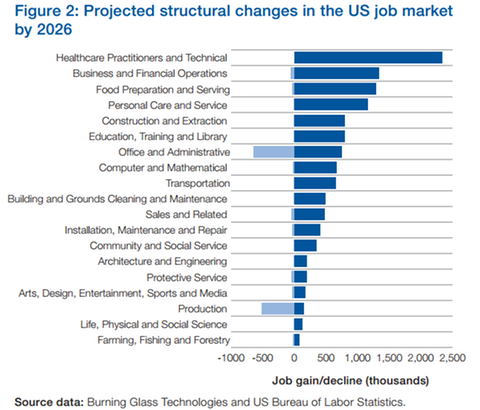Robots could take your job - but you can retrain to find a better one, says WEF report

New technology and automation will eliminate millions of jobs, but workers displaced by robots will be “easily” re-employed after retraining - often in higher paying positions.
The claim comes in new research released by the World Economic Forum (WEF) as it prepares to kick off its annual conference in Davos, and appears ease worries about a looming employment crisis.
The study follows up on a similar report last year, which predicted that new technology in the workplace will mean the loss of 5 million jobs in 15 leading global economies by 2020.

The latest research focused on the impact the “Fourth Industrial Revolution” - digital and traditional technology coming together to deliver efficiencies that will mean more jobs can be automated - will have on employment in the US.
It said that 96pc of the 1.4 million people expected to be displaced by 2026 in the US by new technology will be re-employed in new - usually better - positions.

However, a massive re-skilling programme is needed to put people into these higher paid jobs as in seven out of 10 instances, they will have to undergo a complete career change which requires learning new skills.
Without retraining, only 2pc of workers would have a good chance of moving to better jobs - and 16pc would have no chance at all, according to the report, titled Towards a Re-skilling Revolution: A Future of Jobs for All.
Klaus Schwab, founder of the WEF, said: "The only limiting factor on a world of opportunities for people is the willingness of leaders to make investments in re-skilling that will bridge workers into new jobs."

He added that investment in re-skilling “has very high returns for businesses as well as economies – and ensures that workers find a purpose in their lives”.
The research, produced in conjunction with Boston Consulting Group, found that people in jobs likely to be automated who retrained for two years could receive an average annual salary increase of $15,000.
Without co-ordinated re-skilling, one in four of at-risk workers would lose on average $8,600 of their annual income even if they are successful in moving to a new job.
According to the US Census Bureau’s most recent data, the average per capita income in America is $29,829 a year.
The WEF report said that reacting to changes in the employment market would require a fundamental rethink of training.
WEF said: "Simply to remain employed will require engaging in lifelong learning and regular re-skilling."
The report said that “continuous learning will not only be key to securing employment but also to building stable, fulfilling careers and seizing rewarding job transition opportunities”.
It also warned that employers would no longer be able to rely on new workers entering the job market with the required skills, meaning companies would have to constantly invest in training at all levels.
Governments will also need to make lifelong learning a focus in order to maintain a labour force with the tools needed to fuel inclusive economic growth.

According to the report, 12.4 million new jobs will be created in the US by 2026, though 1.4 million will be lost.
The sector suffering the biggest loss will be office and administrative roles, where 642,000 positions will go, though 751,000 new jobs are forecast to be created over the same period, resulting in a net gain of 109,000.
The production sector will lose 511,000, with 142,000 created, meaning a net loss of 368,000.
Healthcare is predicted to be the best performing sector overall, losing only 10,000, with 2.3 million positions created.


 Yahoo Finance
Yahoo Finance 